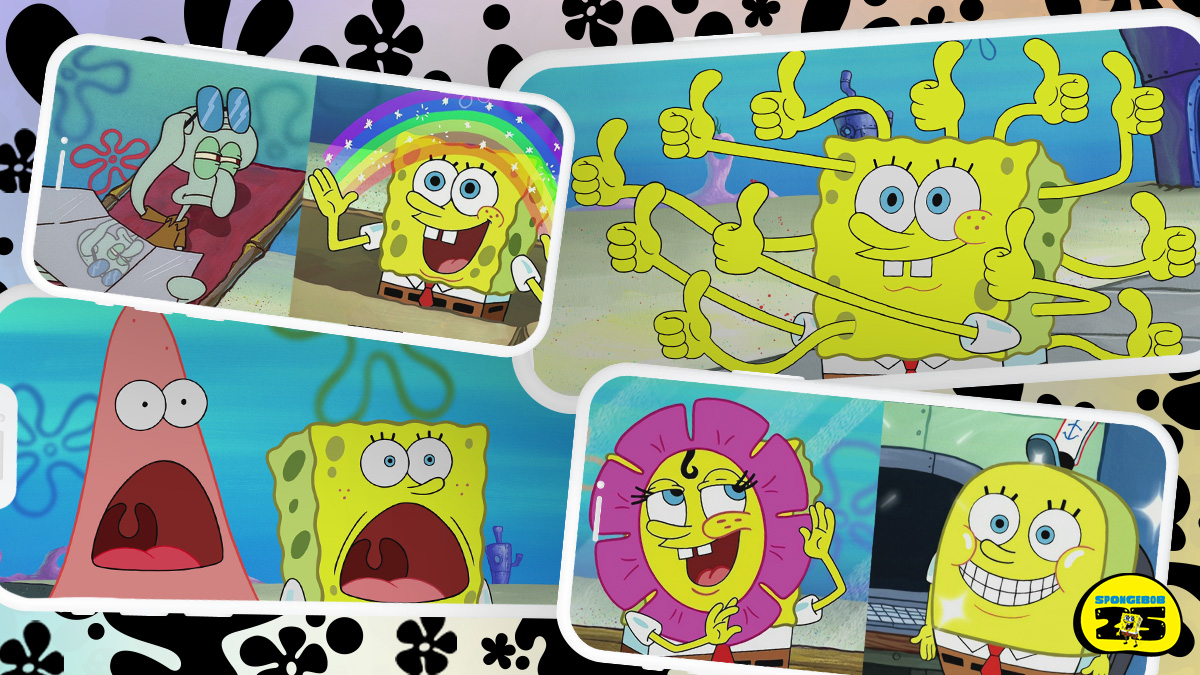The SpongeBob SquarePants Voice Cast Break Down the Show’s Most Iconic Memes
SpongeBob voice stars Rodger Bumpass and Bill Fagerbakke firmly grasp their legacy as internet meme icons.

This article is presented by 
Of all the colorful characters who inhabit Bikini Bottom, outside of SpongeBob, Patrick Star and Squidward may be the two who have inspired the most memes. Their human voice actors, Bill Fagerbakke and Rodger Bumpass, respectively, know all too well about their show’s prominence on social media and TikTok. Just don’t ask them what memes even are.
“You lost me when you said the word ‘meme,’” jokes Bumpass, who voices the cynic Squidward, in a Zoom interview with Den of Geek. “I really don’t have a great definition of what a meme is. The phrase ‘bumper sticker’ comes to mind.”
“It’s an interesting thing to ponder,” adds Fagerbakke, the voice of SpongeBob’s best friend and lovable oaf, Patrick Star. Fagerbakke is even less plugged-in than Bumpass, who at least has a verified Instagram account. Fagerbakke believes any memetic success is owed to the show’s late creator, Stephen Hillenburg. “It all starts with Stephen and who he was as a human being. He was a really gentle, lovely, ferociously creative soul. It all starts there.”
SpongeBob SquarePants premiered on Nickelodeon on July 17, 1999. In the 25 years since, the show has become more than an evergreen pop culture phenomenon. On the internet, the outlandish adventures of an impossibly optimistic sea sponge (voiced by Tom Kenny) and his friends—or barely tolerant coworkers, in the case of Squidward—have inspired too many memes to count. There’s Mocking SpongeBob, there’s Primitive SpongeBob, there’s Savage Patrick, there’s Blurry Mr. Krabs, there’s Unsure Squidward, there’s It’s Not My Wallet, there’s I’mma Head Out, there’s Imagination—it’s all barely scratching the epipelagic zone.
But how and why is SpongeBob SquarePants a meme generator? How is this show so flexible and adaptable that it encompasses the hopes, dreams, fears, and woes of multiple generations?
There are a few obvious answers that may explain why. For one thing, SpongeBob SquarePants arrived in time to appeal to millennials and the first crop of Gen Z, all of whom grew into adults with knowledge of Photoshop and media editing software. Upon maturing and moving into virtual spaces, these generations shared a common reference point in the show’s unforgettable brand of madcap humor. As Mashable writer Chloe Bryan observed in a 2018 piece about the memes: “Aside from its ubiquity, the show is just relatable. Its cast of characters is not only huge but varied in personality, which means every human quirk imaginable (SpongeBob’s disarming earnestness, Squidward’s angsty cynicism) has its moment in the sun.”
Bumpass and Fagerbakke aren’t really online, at least to the degree their peers and audiences are. So they admit to, ahem, not firmly grasping it all. Still, they have their own theories.
Bumpass suggests SpongeBob zigged where other cartoons of its time zagged, like Futurama and King of the Hill (“Which are wonderful themselves”). The actor owns a vast collection of memorabilia that is all visible on Zoom; during his interview, he shows off a three-dimensional figurine of the universally relatable meme Squidward Looking Outside His Window. He uses comedy history to make a point.
“I go back to Steve Martin,” he explains. “In the ’60s, humor was dark. Very political, very dark. Steve Martin said, ‘This will pass. I’m gonna go this other way.’ He positioned himself just right for people to come out of this genre of darkness and go back to silliness. I think that’s what SpongeBob has done.”
Citing a debt to Looney Tunes, Bumpass feels SpongeBob’s safety in nonsense made it a hit with its young audience—and kept them referring to it into adulthood. “It’s simply fun, and that’s what you should want in entertainment. You just want fun.”
Fagerbakke again believes the show’s power rests in Hillenburg’s vision. The word that the creator used to explain the show on the actors’ first day of recording was “innocence.” And while SpongeBob memes can get cynical and dark, the show proves to be a reliable reference precisely because it’s a potent reminder of an innocent time.
“I think it’s a kind of safe space,” Fagerbakke says. “Bikini Bottom is a place where a lot of generations realize they feel comfortable and safe. Now, is it the performance of Tom Kenny? Is it a weird psychological phenomenon due to the colors and shapes? I don’t know for sure. But there is something. Maybe it’s the vivid nature of the characters. Something authentic in the material lends itself well to memes and resonates because of the characters.”
While the SpongeBob actors aren’t meme-savvy, they can still name their favorites. Fagerbakke owns a t-shirt of Shocked Patrick, with Patrick sitting atop a sloth in outer space. “I don’t even know what episode it’s from. But I love the way that’s been plugged into things,” he says.
For Bumpass, he encounters “Future Squidward” with strange regularity, while “Handsome Squidward” is his most popular autograph at conventions. “People will come across the floor when they see I have that to offer. It’s a tremendous thing. People love it.”
His personal favorite, however, is Unsure Squidward. “We have a legacy thing from Ren & Stimpy called the ‘gross-up’: when someone says something and they cut to a still frame, very detailed and usually gross. I have it on eight-by-tens I sell at comic cons. When people come to my table, they pick that up and say, ‘That’s me in the morning.’ There’s a relationship to that moment, a connection. That’s a nonverbal meme.”
Easily, the most popular meme must be Squidward Looking Outside His Window. Bumpass offers this nugget of wisdom into its universality. “When we observe and don’t participate, there’s a break in our reality,” he says. “Squidward’s life is being left out. He hasn’t achieved any sort of success. He has to fall short. That is essential to his character. He has frustration and tries to compensate by being superior to others. Sarcasm is his shield.”
Both Bumpass and Fagerbakke are surprised by how far SpongeBob SquarePants has come. They each felt differently about the show’s prospects in the beginning. Take Fagerbakke, who was not amused at first.
“When I first saw the pilot on the page, I didn’t understand it,” he admits. “I thought it was preschool drivel. It wasn’t until I saw the pilot that my brain exploded. I realized what a wonderful cartoon I’d been a part of. Then, I understood the nature of the characters, the visual nature of the humor. From that point, I finally understood it.”
Bumpass barely remembers his audition for the show. “It was just another audition back then,” he recalls. “You read your copy, you go home, and forget about it. I got a copy of the pilot, took it home to my family, and played it for them, and they all fell asleep.” It wasn’t until a few years later, walking into Target, where Bumpass saw SpongeBob in every aisle, that he felt there were lasting sea legs. “My wish is that we last just a little bit longer than the pyramids,” he quips.
There’s no better barometer for cultural relevance than the Super Bowl. More than once, SpongeBob has been used to bridge the worlds of professional football and cartoons.
In 2019, shortly after Hillenburg’s passing, fans petitioned for “Sweet Victory” to be performed at halftime during Super Bowl LIII. The “Eye of the Tiger”-esque anthem originates in the episode “Band Geeks,” where Squidward enjoys a rare moment of triumph as the conductor during a football game. Bumpass isn’t sure what was meant to happen, but he was aware of vague discussions for that year’s act, Maroon 5, to perform the song. “That was the proposal, I think,” he says. “Time is precious in a Super Bowl halftime show, so they decided they’d rather do their own pieces.”
Five years later, Super Bowl LVIII was broadcast on Paramount-owned CBS, allowing stronger synergy and for SpongeBob SquarePants and Patrick Star to get into the game. On Nickelodeon, Kenny and Fagerbakke conducted color commentary in character. Fagerbakke, who’s a lifelong fan of pro football, was basically “Shocked Patrick” IRL.
“I’m still coming to grips with what happened,” Fagerbakke says. He had already performed commentary over a different game a season prior when Nickelodeon aired a match-up between the Rams (Fagerbakke’s favorite team) and the Broncos. But the Super Bowl broadcast was a different matter entirely, “not the least of which being constantly in the action.”
“It was exhausting,” Fagerbakke says. “It was an overtime game. To play a character within that context for four hours was nuts. I just didn’t want to blow it.”
Fans who watched the game on Nickelodeon were impressed by the actors’ performance, maybe even more than the performance of the athletes. Fagerbakke’s preparation included making notes, allowing him to deploy iconic lines at any moment. “Both games, I prepared, and was looking for opportunities. It was funny: Tom couldn’t care less about football, whereas I was so jazzed to be there. Nonetheless, we balanced out because it didn’t matter if we knew football. It was more about having fun.”
There isn’t one clear answer as to why SpongeBob SquarePants has had such a seismic influence over the internet’s collective sense of humor. A confluence of the show’s vibrant creativity, the passion of its artists and actors, and an audience all too eager to have a laugh all contribute to the show’s rare place in the cultural canon.
“It’s that triumvirate of writing, animation, and characterization by the performance,” says Bumpass. “We are in 180 markets, over 31 languages. We, as actors, don’t do [all] the voices. That suggests and demands conclusion; there’s something other than the performances that makes this show popular in a universal way. There’s some dynamic in there, and the dynamic I come back to is: funny is funny. I think it’s just one of those intangibles. It just works.”
Fagerbakke still thinks everything goes back to Hillenburg and how he oversaw a roster of “incredibly talented people.” He adds: “I’m sure there have been meetings at studios like, ‘How do we get a SpongeBob?’ Find a Hillenburg and let them create.”

